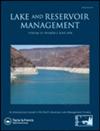Assessing the ecological responses of a shallow mesotrophic lake to multiple environmental stressors using paleolimnological techniques
IF 0.8
4区 环境科学与生态学
Q4 LIMNOLOGY
引用次数: 0
Abstract
Abstract Murphy MJJ, Sivarajah B, Grégoire DC, Vermaire JC. 2022. Assessing the ecological responses of a shallow mesotrophic lake to multiple environmental stressors using paleolimnological techniques. Lake Reserv Manage. 38:67–79. White Lake, located in southeastern Ontario, Canada is a long, shallow, multibasin lake that supports recreational activities year-round and has 1538 private and commercial dwelling units. The construction of a dam at Waba Creek in 1845 resulted in the minimum water level at White Lake increasing by ∼1.5 m, and several water-level management strategies have been implemented since the mid 20th century. The lake has also been impacted by land-clearance activities and shoreline development along the eastern shores and is presently mesotrophic. More recently, White Lake was colonized by zebra mussels (Dreissena polymorpha) in 2015, and annual algal blooms have also been observed. In this paleolimnological study, diatom-based approaches and loss on ignition were used to track past changes in water quality and sediment characteristics, respectively, to inform the White Lake Property Owners Association’s ongoing lake monitoring program. The diatom-inferred total phosphorus (DI-TP) reconstruction suggests that White Lake has been mesotrophic (DI-TP range 11.5 − 17 µg/L) over the past ∼200 years. Notable changes in the diatom assemblages and declines in sedimentary organic content were recorded around the 1890s in the sediment core retrieved near Hardwood Island. The decrease in sedimentary organic content was likely a response to early land-clearance activities around the lake as erosion often leads to greater inorganic export from the catchment to the lake. The switch among benthic fragilarioid diatom taxa suggests that the light conditions at this shallow lake may have changed in response to higher allochthonous inputs. Continuous monitoring of White Lake is needed to ensure that the cumulative impacts from emerging environmental stressors (e.g., climate-mediated changes, invasion by dreissenids) are considered when making management decisions.利用古湖沼学技术评估浅水中营养湖泊对多种环境压力的生态响应
[摘要]Murphy MJJ, Sivarajah B, grsamuire DC, Vermaire JC。2022. 利用古湖泊学技术评价浅层中营养型湖泊对多种环境胁迫的生态响应。湖泊保护区管理。38:67-79。白湖位于加拿大安大略省东南部,是一个长而浅的多盆地湖泊,全年都支持娱乐活动,拥有1538个私人和商业住宅单元。1845年在瓦巴河修建大坝导致白湖的最低水位增加了约1.5米,自20世纪中期以来实施了几种水位管理策略。该湖还受到土地清理活动和东岸岸线开发的影响,目前处于中营养型。最近,在2015年,白湖被斑马贻贝(Dreissena polymorpha)殖民,每年的藻类繁殖也被观察到。在这项古湖泊学研究中,研究人员分别采用硅藻为基础的方法和燃烧损失来追踪水质和沉积物特征的过去变化,为白湖业主协会正在进行的湖泊监测项目提供信息。硅藻推断的总磷(DI-TP)重建表明,在过去的200年里,白湖一直是中营养型的(DI-TP范围为11.5 ~ 17µg/L)。在哈德伍德岛附近的沉积物岩心中记录了19世纪90年代前后硅藻组合的显著变化和沉积有机质含量的下降。沉积物中有机物含量的减少可能是对湖周围早期土地清理活动的反应,因为侵蚀经常导致从集水区向湖泊输出更多的无机物质。底栖脆弱硅藻类群之间的转换表明,该浅湖的光照条件可能因更高的外来输入而发生变化。需要对白湖进行持续监测,以确保在制定管理决策时考虑到新出现的环境压力因素(例如,气候介导的变化,水蛭入侵)的累积影响。
本文章由计算机程序翻译,如有差异,请以英文原文为准。
求助全文
约1分钟内获得全文
求助全文
来源期刊

Lake and Reservoir Management
环境科学-海洋与淡水生物学
自引率
6.70%
发文量
22
期刊介绍:
Lake and Reservoir Management (LRM) publishes original, previously unpublished studies relevant to lake and reservoir management. Papers address the management of lakes and reservoirs, their watersheds and tributaries, along with the limnology and ecology needed for sound management of these systems. Case studies that advance the science of lake management or confirm important management concepts are appropriate as long as there is clearly described management significance. Papers on economic, social, regulatory and policy aspects of lake management are also welcome with appropriate supporting data and management implications. Literature syntheses and papers developing a conceptual foundation of lake and watershed ecology will be considered for publication, but there needs to be clear emphasis on management implications. Modeling papers will be considered where the model is properly verified but it is also highly preferable that management based on the model has been taken and results have been documented. Application of known models to yet another system without a clear advance in resultant management are unlikely to be accepted. Shorter notes that convey important early results of long-term studies or provide data relating to causative agents or management approaches that warrant further study are acceptable even if the story is not yet complete. All submissions are subject to peer review to assure relevance and reliability for management application.
 求助内容:
求助内容: 应助结果提醒方式:
应助结果提醒方式:


